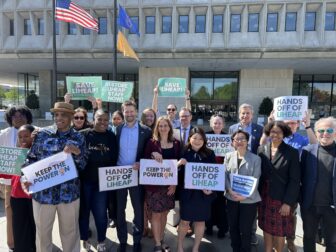Without first measuring risks to people and land, state proposes inadequate ‘best practices’ guidelines for drilling
BALTIMORE—Despite explicit concerns from landowners and environmentalists, the Maryland Department of the Environment (MDE) yesterday issued a “best practices” draft report for companies that want to drill for fracked natural gas in Maryland. The agency released the report before formally assessing and inventorying the actual risks of the controversial drilling method itself. The failure to assess the likely impacts of fracking on human and natural communities—as a first step—renders the “best practices” report premature and deeply problematic, according to Maryland civic and environmental leaders.
“The cart has been put before the horse on fracking in Maryland,” said Mike Tidwell, director of the Chesapeake Climate Action Network. “What sense does it make to lay out guidelines for the ‘best way’ to frack for natural gas when the state hasn’t formally inventoried the risks and harm that could come the moment drill bits enter our soil?”
CCAN and other groups—including Mid-Atlantic Council of Trout Unlimited and western Maryland-based Citizen Shale—contend that no best management practices report can be legitimate until a full risk assessment study has been completed. Governor O’Malley’s 2011 “Marcellus Shale Safe Drilling” executive order on fracking sets a goal of determining “whether or how” drilling could happen in Maryland without “unacceptable risks of adverse impacts.” According to the groups, an accurate determination of “whether” must be based in thorough scientific assessments of the unique impacts to Maryland. Instead, state officials have fast-forwarded to an incomplete and inadequate answer of the “how”—a literature review and analysis of drilling practices being used or proposed elsewhere. State officials have suggested a separate risk report will be issued later, by August 2014.
Groups concerned about fracking have specifically asked MDE and the Maryland Department of Natural Resources (DNR) to underwrite a risk study similar to a European Commission study issued in November 2012. That study analyzed drilling data from across the U.S. to assign risk grades of low, moderate, high or very high to various stages of the fracking process, including threats from water contamination, increased truck traffic on rural roads, and increases in greenhouse gas pollution.
Despite lacking such an assessment for Maryland—where fracking has not yet taken place—MDE released yesterday for public comment its “Marcellus Shale Safe Drilling Initiative Study Part II – Best Practices.”
Beyond concerns that the report’s release is premature, groups criticized the content of the report as well, saying it doesn’t propose actual requirements to force gas companies to improve on faulty drilling practices linked to widespread harm in other states.
For example, concerning global warming pollution from leaked methane gas, the report recommends the use of improved drilling and piping methods but offers very few specific recommendations for gas companies to follow. Recent studies by the EPA and World Resources Institute show leakage of harmful methane could be kept to well below one percent by using existing technology and methods. Maryland groups contend companies could then cancel out any remaining leakage by investing in carbon “offsets,” thus reaching a de facto leakage rate of zero percent. However, the MDE report includes no specific, mandatory goal.
“Unless the state requires gas companies to meet a zero percent leakage rate for methane, there’s no way Marylanders should even entertain the idea of fracking in this state,” said Tidwell. “Even then, there’s no way to assess the full environmental and human health threats—beyond global warming—until we get the horse in front of the cart. We need a comprehensive risk assessment—at least as strong as the European Commission’s—before talk of ‘best practices’ for drilling is even conceivable. If the state finds ‘unacceptable risks’ would come from fracking, then Governor O’Malley must hold to the standard of his executive order and reject it altogether.”
Contact:
Mike Tidwell, 240-460-5838, mtidwell@chesapeakeclimate.org
Megan Jenny, 240-396-1993, megan@chesapeakeclimate.org
###




